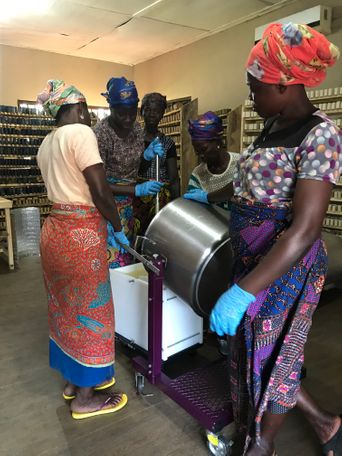We handcraft our Shea butter in the Northern region of Ghana, West Africa under fair trade and organic standards. How it all started.
 Ajike Shea Centre is a social enterprise which was established to empower rural women who are the backbones of their families. Located at the Northern Region of Ghana, West Africa, the centre was created not only to provide sustainable stable income in the Shea butter production but so that these women can also start other businesses that would be an additional source of income so they are able to send their children to school throughout the year.
Ajike Shea Centre is a social enterprise which was established to empower rural women who are the backbones of their families. Located at the Northern Region of Ghana, West Africa, the centre was created not only to provide sustainable stable income in the Shea butter production but so that these women can also start other businesses that would be an additional source of income so they are able to send their children to school throughout the year.
When Ajike came in contact with one of the women in the community from whom she buys Shea butter for her hair and body butter, she learnt of their hardship and how middlemen have been taking advantage of their situation.
She finally visited the women in their communities after a 14hrs road journey from the city of Accra. There she saw their suffering and hardship first-hand as she saw very old women in their 70’s still producing Shea butter because according to them, they would go hungry if they stopped and so they continue until they can no longer walk to the wild to pick the Shea nuts nor have the physical power to kneel during Shea butter production.
Their children also cannot support their aged mothers because they are all in the village as subsistence farmers who also have to depend on their mothers for support.
Before the centre, these women would risk snake bites in the wild to pick Shea nuts that drops from the Shea trees during harvest season, produce unrefined Shea butter after series of tedious processes and get to sell their Shea nuts and butter cheaply to middlemen on credit who will pay 3 weeks later after these middlemen sell with a very high profit margin. Producing at the centre gives them the opportunity to be in charge as they not only get paid by the centre for the fresh Shea nuts they have picked but in addition, they are employed and get paid for the production of their Shea nuts into butter.
When I came in contact with the women, I would give them both new and used clothing items and cash donations. I knew that in as much as those were helping them, it wasn’t going to solve the problem of poverty in their communities but a sustainable and stable income would. From writing my project work in my final year at the university on ‘Gender Discrimination, The right of a Woman in Perspective’ in 2005 to my humanitarian work as a of women empowerment groups including Women International League for Peace & Freedom, (WILPF) Ghana Chapter and a member of the CommNet, a fraction of Women Peace Institute, Koffi Anan International Peace Keeping Institute, Ghana, I knew I had to do something to change the situation of these women and their communities as a whole. For me, it is more of a purpose than a passion – Ajike Adebimpe Dsani, Founder




